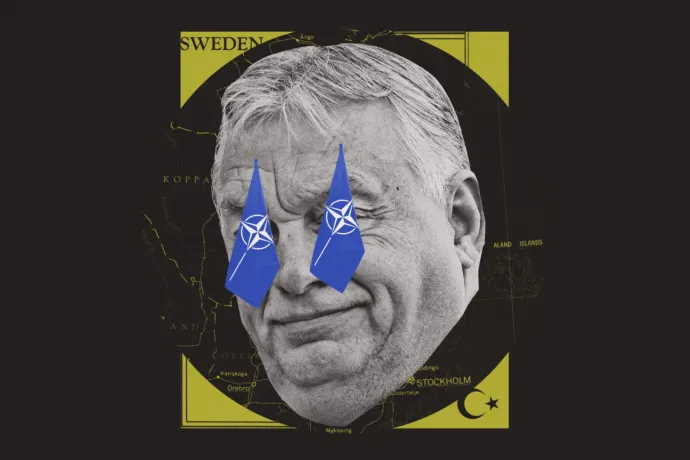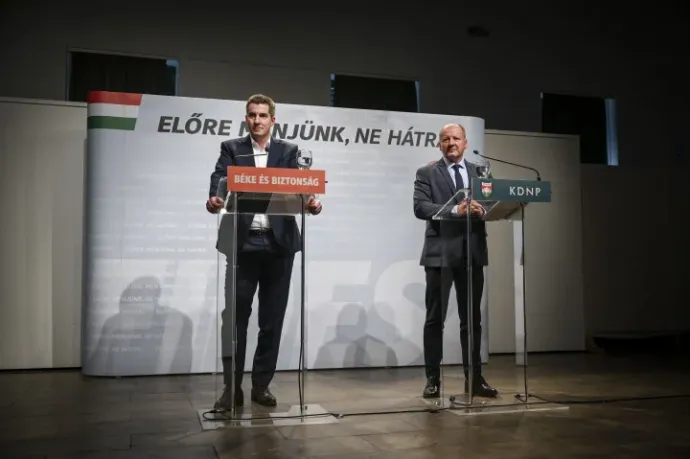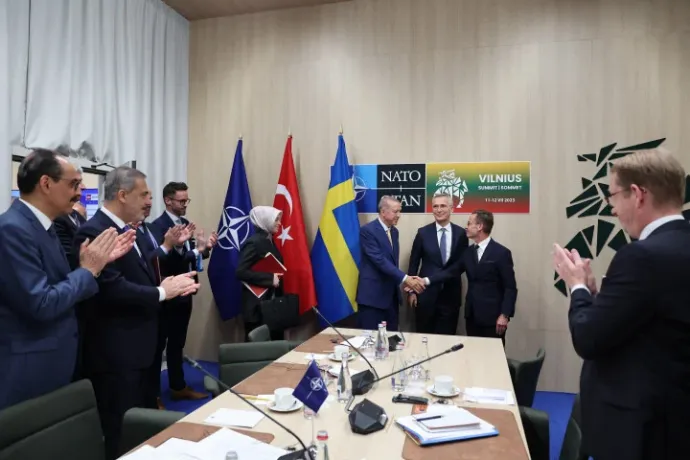
After a long delay, the Turkish Parliament voted in favour of Sweden's accession to NATO on Tuesday. Hungary has thus become the last NATO member state that has not yet approved the Scandinavian country's entry into the military alliance. The ruling party's MPs have been sitting on the subject for at least a year and a half over "insults" and other misgivings, while repeatedly promising that Hungary would not be the last to approve Sweden's accession. And yet, this is exactly what has happened in the end.
Viktor Orbán even invited the Swedish Prime Minister for negotiations at the very last minute, but it was no use. The Swedes replied that they saw no reason for a meeting. Swedish Foreign Minister Tobias Billström did, however, add in his brief reply that they hoped Hungary would ratify their NATO membership as soon as possible. The Hungarian Prime Minister has now vowed to bring this issue to a conclusion at the earliest opportunity. This will not be that simple, given that the next session of parliament is scheduled for the end of February, and calling an extraordinary session would be a serious loss of face.
Sweden and Finland decided to join NATO in May 2022, shortly after the outbreak of the Russian-Ukrainian war. Out of the thirty member states of the military alliance, twenty-eight ratified the application almost immediately afterwards, only Turkey and Hungary decided to hold out. For an accession to be finalized, all countries must approve membership.
Although Foreign Minister Péter Szijjártó submitted the draft bills on the Finnish and Swedish applications to Parliament that July, the matter still has not not made it onto the agenda. However, as we’ve seen in the past, if the governing party MPs are so inclined, they can push bills through parliament in a matter of days or weeks. For example, it took two days to pass the amendment to the law on the taxation of self-employment, and a mere ten days to approve raising the Prime Minister's salary.
They did not give in easily and even set conditions
From the very outset, Turkey made it clear that it would not give in easily, that it wasn’t just going to approve the accession of the Swedes and Finns, and that the Nordic delegations should not bother trying to persuade them otherwise.
Turkish President Recep Tayyip Erdoğan, for example, claimed that Sweden is a hotbed of terrorism and that the two countries are "harbouring" people who may have links to the Kurdistan Workers' Party (PKK), which they consider a terrorist organisation, and to the religious group of US-based Turkish cleric Fethullah Gülen, which the Turkish leadership accuses of anti-state activities. Erdoğan also pressured the US to deliver F-16 fighter jets to Turkey, but the White House made Swedish membership a precondition for the deal. Another thing the Turks were not too happy about was having a dummy resembling the Turkish president hung at a demonstration in Sweden, and a Danish far-right activist burning a copy of the Quran at another rally held in the country.
In the end, they figured out that they were offended
The Turks sat down for talks with the Swedes and the Finns on the issue several times, but the Hungarian government gave little reason for not putting Sweden's NATO membership on the parliament's agenda for quite a while. At one point they said it was because there are so many important items before Parliament, "the House is in full swing", and they cannot be rushed. Then they blamed it on MPs being swamped with negotiating the legislation necessary for reaching the agreement with the EU.
They did make promises though: first, in 2022, there was a "good chance they would vote on it this year", perhaps during the autumn session. Then they said that it would probably be in 2023, but the chances of that happening are slim, so it would likely be in 2024.
There was nevertheless some debate on it in Parliament along the way. Last spring, the government MPs found a new excuse: they went on and on about all the ways in which they had been insulted by Finnish and Swedish politicians. "They make comments about the Hungarian government, our judiciary, the situation of our media, and they keep on insulting us" and added that "if one is asking for something, one should be wise enough not to start slapping the other party". They also promised that it would not be up to them in the end. "We will not be the very last, that's for sure", minister Lajos Kósa said.
Then, the Fidesz-KDNP faction held an off-site meeting in Balatonfüred, where they came up with the argument that while the government and Viktor Orbán very much support the accession of the two countries, there is unfortunately a serious debate within the group "due to uncertainty and offense". One would be hard-pressed to find a similar situation in the last 13 years of a disagreement between the government and the governing coalition's faction on any single issue.

In keeping with the spirit of double-dealing, they called on House Speaker László Kövér, to send a delegation to the two countries "for orientation purposes". The delegation was led by former Defence Minister Csaba Hende and Zsolt Németh, the Chairman of the Foreign Affairs Committee. The Hungarian delegation took a group photo in Stockholm, and Hende announced that they were satisfied with the visit and supported the countries' accession.
And then, all of a sudden everyone became more lenient with the Finns
Another important visit took place soon afterwards: on 16 March 2023, Hungarian Prime Minister Viktor Orbán went to Ankara, and the next day it was announced that the Finns' accession would be approved. After an eight-month delay, the Hungarian Parliament voted in favour of the Finns' application on 27 March 2023, and Turkey followed suit four days later. For some reason, Erdoğan became more accommodating to the Finns around the same exact time.
But the Swedes still hadn't managed to convince either of them. Turkey complained that Stockholm had not yet handed over the 120 "terrorists" that Ankara had demanded. The Hungarian government expected something else from the Swedes: "reassurance", as according to them, the Swedes had "insulted the Hungarian electorate, their representatives and thus all of Hungary". But they did not specify what this reassurance should look like. Orbán even said that political relations between Hungary and Sweden must improve, because they were "just dreadful" and they "do not wish to import conflicts into NATO".
Even at this point, governing party MPs insisted that they otherwise supported Swedish accession, and once again promised that Hungary would not be the last to ratify the Swedes' application.
Meanwhile, NATO member states kept urging the Hungarians and Viktor Orbán to support the Swedes: the Germans, the V4, US President Joe Biden, NATO Secretary General Jens Stoltenberg, the Hungarian opposition, and even Hungarian president Katalin Novák stated last spring that it was time for ratification.
Concerned for Swedish democracy
Then last autumn, the tables turned again, and Hungarian government politicians became worried about the state of Swedish democracy. Tamás Menczer, State Secretary at the Ministry of Foreign Affairs, published a video in which he explained that he believed we should be concerned about the shootings, murders and explosions happening in Sweden, and said that there were no-go zones everywhere and Christians were being persecuted for their faith. But the things cited by the Secretary of State had more to do with the state of public security and the country's integration policy than with Swedish democracy itself.
Then suddenly, the government and Fidesz politicians came across an educational video made in 2019 and later broadcast in Sweden, entitled The EU and democracy. It included a statement from Hungarian activist Márton Gulyás saying that democracy has been slowly disappearing in Hungary since 2010.
The film prompted Foreign Minister Péter Szijjártó to hint at the continued obstruction of Sweden's NATO membership, while Minister of the Prime Minister's Office Gergely Gulyás said that "Sweden seems to be doing everything in its power to make sure Hungary doesn't ratify its NATO membership".
House Speaker László Kövér went as far as to say that "it is not so sure that they have to vote in favour" of Sweden's accession to NATO.
They still expected respect, of course. Viktor Orbán, for example, said that "there is nothing threatening Sweden's security. We have no military relationship with Sweden that would give us reason for concern. (...) There is no strategic element in Swedish-Hungarian relations that would be damaged if Hungary demands respect from Sweden and is only then willing to take a supportive decision," Orbán said.
Waiting (or not) for the Turks
After repeatedly failing to put the Swedish application on the agenda, House Speaker Kövér declared that "there's no reason for Parliament to wait for the Turks, it can make a decision whenever it wants to". This was later confirmed by Gergely Gulyás, who – speaking at a government briefing – in April last year said that "there is no agreement between Hungary and Turkey about aligning the date of ratifying Sweden's accession to NATO".
Then last summer, out of the blue, standing alongside NATO Secretary General Jens Stoltenberg, Erdoğan announced his support for the Swedish accession to NATO. After it became clear that the Turks would give the go-ahead to the Swedes, Zsolt Németh, Chairman of the Parliament's Foreign Affairs Committee, went against the governing party's previous narrative and said: Viktor Orbán will certainly discuss Sweden's NATO membership with Erdoğan and then "they will know more" and "would communicate the government's position". And besides, he was convinced that Hungary would approve Sweden's accession to NATO before the Turks.

Adding to this, Foreign Minister Péter Szijjártó said that Viktor Orbán had discussed the matter with the Turkish President, that they had consulted on it, and that they would continue to do so in the future. At his annual government briefing on 21 December 2023, the Prime Minister himself also denied that there was an agreement between the Hungarians and the Turks on Sweden. Viktor Orbán said that the Hungarian Parliament simply "can not stomach" the decision.
Meanwhile, in Turkey, things started moving ahead. In the autumn, Erdoğan submitted a proposal for the ratification of Sweden's accession to NATO to the Turkish Parliament, and in December the Turkish Parliament's Foreign Affairs Committee approved the request. At the time, speaking for the Hungarian government, Szijjártó was still promising that Hungary would not be the last country to vote on Sweden's NATO accession, and in early January Gergely Gulyás reiterated that the Hungarian government wanted to avoid being the last country to ratify Sweden's accession.
Then this week, news broke that the Turkish Parliament may vote on Sweden's accession to NATO very soon. On Tuesday, Orbán quickly invited the Swedish Prime Minister to Hungary to discuss their NATO membership as well as "deepen mutual trust". The Swedish Foreign Minister responded to the letter by saying that Sweden saw no reason for discussions in Hungary. The Turkish Parliament ratified Sweden's application for NATO membership the same day.
Orbán then phoned NATO Secretary General Jens Stoltenberg, and promised to urge Parliament to "vote in favour of Sweden's accession and conclude the ratification process at the earliest opportunity".
The first available opportunity in this case would officially be the end of February, since according to the information available so far, the spring session of Parliament is scheduled to start on 26 February. This does not, of course, rule out the possibility of calling an extraordinary session before then, during which Sweden's accession to NATO could also be put to the vote – a year and a half after the proposal was tabled, being the last of the 30 NATO members to do so. It would be a major blow to the government's reputation though if, after more than a year and a half of flexing its muscles, it had to call an extraordinary session of Parliament just for this.
We sent questions to both Viktor Orbán and the Foreign Ministry about the Swedish rejection of the invitation and the Turks' sudden move, but as of the time of writing, we haven't heard back.
For more quick, accurate and impartial news from and about Hungary, subscribe to the Telex English newsletter!